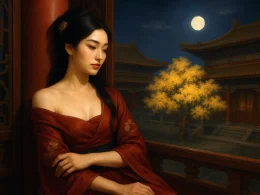All willow-down has fallen and sad cuckoos cry
To hear you banished southwestward beyond Five Streams.
I would confide no sorrow to the moon on high
For it will follow you west of the Land of Dreams.
Original Poem
「闻王昌龄左迁龙标遥有此寄」
李白
杨花落尽子规啼,闻道龙标过五溪。
我寄愁心与明月,随君直到夜郎西。
Interpretation
This poem was composed during Emperor Xuanzong's Tianbao era when Li Bai learned that his close friend Wang Changling had been demoted to Longbiao (present-day Qianyang, Hunan) due to "minor improprieties." Filled with righteous indignation and profound regret, Li Bai wrote this poem to express his longing and consolation. Wang Changling, renowned for his masterful quatrains and literary fame, suffered repeated setbacks in his official career, making this demotion particularly unjust. Through natural imagery and the moon, Li Bai conveys his deep friendship while reflecting on life's unpredictability.
First Couplet: "杨花落尽子规啼,闻道龙标过五溪。"
Yáng huā luò jìn zǐ guī tí, wén dào lóng biāo guò wǔ xī.
Catkin blossoms wither, cuckoos cry; I hear you passed Five Streams, banished to Longbiao.
The poet uses the imagery of falling catkins and mourning cuckoos to create a melancholic atmosphere, expressing his sorrow and indignation at his friend's unjust demotion. "Five Streams" symbolizes the remote and desolate place of exile, highlighting Wang Changling's hardship and reflecting Li Bai's discontent with the fickleness of officialdom.
Second Couplet: "我寄愁心与明月,随君直到夜郎西。"
Wǒ jì chóu xīn yǔ míng yuè, suí jūn zhí dào yè láng xī.
I entrust my grieving heart to the bright moon, To follow you west to Yelang's farthest reaches.
Here, the poet personifies the moon as a vessel for his emotions, making it a medium for his longing. The boundless moon symbolizes the spiritual connection between the poet and his friend, demonstrating that true friendship can transcend distance and time. These lines reveal Li Bai's deep concern and heartfelt solace for his friend's plight.
Overall Appreciation
This poem is ingeniously crafted, blending scenery with emotion in a sincere and profound manner. The opening lines use late spring imagery to establish a mournful tone, while "Five Streams" emphasizes the remoteness of the exile journey, setting the emotional foundation of the poem. The latter couplet employs the moon as a transcendent symbol, allowing longing to break through the barriers of time and space. This showcases Li Bai's unconventional and liberated way of expressing emotion. Despite its brevity, the poem is rich in meaning, conveying both deep care for his friend and quiet lament for the unpredictability of life and career.
Literary Characteristics
- Emotion Through Scenery, Blending of Feeling and Setting: The falling catkins and crying cuckoos create a sorrowful atmosphere, deepening the poem's emotional resonance.
- Vivid Imagery with Symbolic Depth: The "bright moon" is not just a natural object but a carrier of the poet's longing, transcending reality and enriching the poem's artistic conception.
- Natural Use of Allusion, Enhancing Poetic Meaning: The reference to "Yelang" echoes historical context, hinting at the desolation of Wang Changling's place of exile and subtly criticizing the feudal bureaucracy.
- Concise Language with Profound Meaning: Though only twenty characters long, the poem progresses emotionally, achieving depth through simplicity and immense artistic power.
Insights
This poem not only expresses deep friendship but also reveals the impermanence of life's ups and downs. By entrusting his sorrow to the moon, Li Bai demonstrates that even in adversity, one can remain connected to loved ones and true to genuine feelings. This teaches us that in real life, no matter how great the distance, true friendship can bridge time and space. As long as we hold sincerity in our hearts, friendship will not fade due to changing circumstances.
Poem translator:
Xu Yuan-chong(许渊冲)
About the poet

Li Bai (李白), 701 - 762 A.D., whose ancestral home was in Gansu, was preceded by Li Guang, a general of the Han Dynasty. Tang poetry is one of the brightest constellations in the history of Chinese literature, and one of the brightest stars is Li Bai.












